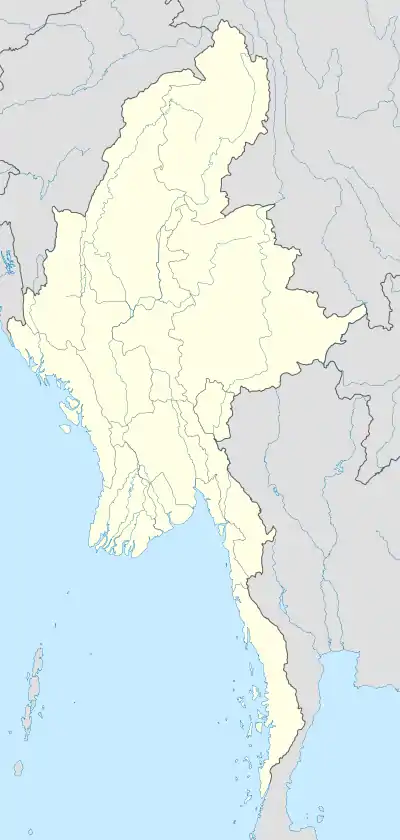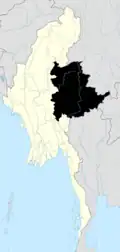Pangkham
Pangkham (Burmese: ပန်ခမ်းမြို့; MLCTS: pan kham: mrui.; Chinese: 邦康; pinyin: Bāngkāng; Wa: Bāng Kam[1]), known before 1999 as Pangsang (Chinese: 邦桑; pinyin: Bāngsāng; Wade–Giles: Pang1-hsang1), is a border town in Myanmar's far eastern Shan State. It is situated at a bend on the Hka River near the border with Yunnan Province, China, opposite of the town of Menglian. Pangkham is the main town of Pangsang Township of Matman District of Shan State.[2]
Pangkham
Pangsang | |
|---|---|
 Pangkham Location in Myanmar (Burma) | |
| Coordinates: 22°10′N 99°11′E | |
| Country | |
| Division | Wa State (de facto) Shan State (de jure) |
| Self-Administered Division (de jure) | Wa Self-Administered Division (de jure) |
| Special District (de facto) District (de jure) | Bangkum Special District (de facto) Matman District (de jure) |
| Population (2002) | |
| • Total | 15,000 |
| • Ethnicities | Wa Shan Han Chinese |
| Time zone | UTC+6.30 (MMT) |
It has hotels, shops, a supermarket, karaoke bars, a bowling alley, and a 24-hour casino.[3] There is a thriving night life centered on the casino. Food in Pangkham is mostly imported from China. The cars, mainly Land Rovers, Land Cruisers and foreign pick-ups, have been smuggled in from Thailand.[4]
History
Pangkham is the de facto capital of Wa State, officially designated the Wa Self-Administered Division, while Hopang is its capital assigned by Myanmar government. It is controlled by the United Wa State Army (UWSA), the military wing of the United Wa State Party (UWSP) formed after the collapse of the Communist Party of Burma (CPB) in 1989.[4][5]
On 17 April 2009, the 20th anniversary of the coup against the CPB was celebrated in Pangkham, attended by representatives from the military government, Kokang, Kachin Independence Organisation (KIO), Shan State Army - North, and former members of the CPB.[6]
The next day, on 18 April 2009, a fire destroyed the largest petrol station and over 10,000 tons of teak in a warehouse in Pangkham, both belonging to one of the Wa leaders Wei Hsueh-kang.[7]
References
- Wang Jingliu (2014). 佤汉大词典 [Wa - Chinese Dictionary]. Kunming: Yunnan Nationalities Publishing House. p. 1175. ISBN 978-7-5367-6031-8.
- "Shan Herald Agency for News (S.H.A.N)". English.panglong.org. 22 January 2016. Archived from the original on 24 September 2015. Retrieved 5 February 2016.
- Andrew Marshall, Anthony Davis (16 December 2002). "Soldiers of Fortune". TIME asia. Archived from the original on 3 February 2003. Retrieved 21 February 2009.
- Tor Norling. "Haven or Hell". The Irrawaddy, 11 July 2008. Archived from the original on 6 October 2010. Retrieved 21 February 2009.
- "Panghsang tightening security". Shan Herald Agency for News (S.H.A.N.). 4 June 2005. Archived from the original on 11 February 2009. Retrieved 21 February 2009.
- Wai Moe. "UWSA Leader Calls for 'Solid, United' Wa State". The Irrawaddy, 17 April 2009. Archived from the original on 27 April 2009. Retrieved 19 April 2009.
- "Fire in Panghsang". Shan Herald Agency for News (S.H.A.N.). 19 April 2009. Retrieved 19 April 2009.
External links
- Satellite map GeoNames
- Panghsang area mapShan Herald Agency for News (S.H.A.N.)
- Myanmar's Wa: Likely Losers in the Opium War Pierre-Arnaud Chouvy, Asia Times, 24 January 2004
- Photo: Panghsang - bridge to the hidden city Something about Myanmar, 28 February 2006
- Photo: UWSA on parade at Panghsang The Irrawaddy, 4 May 2009

